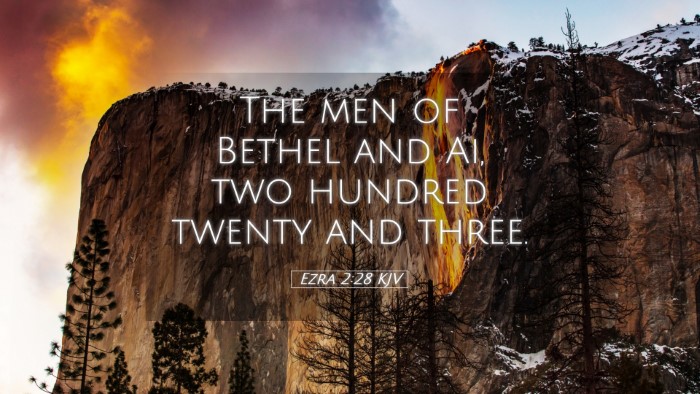Commentary on Ezra 2:28
Ezra 2:28 states: "The men of the city of Beth-el, four hundred and twenty-three."
This simple verse is significant in its listing of those who returned from exile, revealing deeper layers of meaning relating to identity, community, and God’s providence throughout the history of Israel.
Historical Context
The return from Babylonian exile marked a pivotal moment in Jewish history. The list of those returning, including the residents of Beth-el, serves multiple purposes:
- Restoration of Identity: The mention of Beth-el signifies a return to a place of worship and historical importance, reinforcing the identity of the returning Jews as God's covenant people.
- Reinforcement of Community: This gathering is not just a physical return, but a spiritual and communal restoration. It highlights the importance of towns and specific identities within the larger narrative of God's people.
- Covenantal Continuity: The number "four hundred and twenty-three" connects to God's fidelity to His promises, suggesting divine order in the returning of His people.
Commentary Insights
Matthew Henry’s Perspective
Matthew Henry emphasizes the significance of the returning exiles. He notes that the enumeration of those from Beth-el—and others throughout the chapter—serves to illustrate God's faithfulness in preserving a remnant. Each name and number holds weight in the grand narrative of redemption.
Henry also points to the spiritual renewal that began among these returned exiles, implying that their return was an answer to prayer and a restoration of worship, foreshadowing the future rebuilding of the temple and reinstating sacrifices.
Albert Barnes’ Commentary
Albert Barnes highlights the importance of the mention of Beth-el specifically as a significant site in Israel's history, noting that it is the place of Jacob’s dream (Genesis 28:10-22). This connection serves to remind the Israelites of their heritage and the covenant promises made by God at this location.
Barnes expresses that the specific number, four hundred and twenty-three, indicates a well-organized return, which was likely necessary for the re-establishment of order in the community. He comments on the practicality of needing numbers to appropriately re-populate and reconstruct the cities of their forefathers.
Adam Clarke’s Analysis
Adam Clarke takes a detailed look at the concept of numbers within the biblical narrative. He explains that the numerical figure should not just be seen as a statistic, but as a representation of lives and households that are being revitalized in Judah. Clarke posits that each returned individual was vital to the reinstatement of worship and society in the promised land.
Clarke also suggests that these numbers are indicative of God's overarching plan, and the returning of the exiles was part of His sovereign purpose to bring His people back into covenant relationship. Furthermore, he comments on the significance of communal bond as they return to rebuild not only the physical places but their spiritual lives.
Theological Reflections
This brief verse serves as a powerful reminder of God's faithfulness to His people and His ability to restore. The mention of Beth-el stands as a symbol of the location where heaven and earth met, showing that their return was not merely geographical but deeply spiritual.
For pastors and theologians, this passage can be a foundation for sermons on restoration, identity in Christ, and God’s continual work in the life of His church. The numbers serve as a representation of God’s people—each individual carries a story and a purpose in God’s plan.
Conclusion
Ezra 2:28 encapsulates not just a historical account but also a profound theological truth about belonging, restoration, and the ongoing relationship between God and His people. Understanding the layers of this verse can enrich the study of biblical history and provide valuable insights into God's covenant faithfulness.


